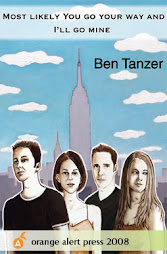 “The world is paying a heavy price for the instability created by globalization and unipolarity, and the United States is bearing most of the burden”
“The world is paying a heavy price for the instability created by globalization and unipolarity, and the United States is bearing most of the burden”In the latest issue of “Foreign Policy”, Steven Weber, Naazeen Barma, Matthew Kroenig, and Ely Ratner have published an article entitled “How Globalization Went Bad”. They present their argument in three clear axioms:
1. Above a certain threshold of power, the rate at which new global problems are generated will exceed the rate at which old problems are fixed. It is basically the belief that with more power comes more responsibility, but can the U.S. handle more responsibility. Do we need more power?
2. In an increasingly networked world, places that fall between the networks are very dangerous places. In the global economic pictures there will be big players and little players, and those who are not allowed to play at all. It is the latter that will disrupt the global orgy.
3. Without a real chance to find useful allies to counter a superpower, opponents will try to neutralize power, by going under ground, going nuclear, or going "bad". Example Venezuela, North Korea, the idea is that these smaller powers will not be able to align with a bigger power and be forced into "facilitating the dark side of globalization".
The article goes on to discuss the threat of a global pandemic being brought to fruition by a forgotten nation. The solution, according to the article, is the emergences of another superpower to remove some of the burden on the shoulders on the U.S. It doesn't seem feasible to both openly trade with and police the same country. What do you think, does America need to take a lesser role in the global realm of business, politics, and security? What is your opinion of America's push toward a global economy while also maintaining unipolarity? Talk amongst yourselves...
+by+Nick+Volkert).jpg)





















1 comment:
As much as I hate to say it, most of these problems could be fixed with not another super power, but a consolidation of power. I think another super power would create the same situation we've always had with the USSR and Russia. The most logical next super power would be China. I don't know about you, but I think that could create a potential problem since the East and West political and social ideologies are so different.
That really only leaves consolidation of power as a true solution to these problems. We're talking a one world government where open markets and freedom would be policed by all countries under the same guidelines and punishable by the same consequences. That's really the only way to eliminate an underground. If everyone is looking out for it, and the power of the world condenses to fight one enemy. It would be pretty easy too. The super power one world government would have the strength, technology, and numbers. The underground would have none of that, no communication, no leadership and no system of cooperation. They could be taken out one at a time.
Herein lies the problem...
Without going into too much conspiracy or illogic, one could think that for every pro, there needs to be a con, yin and yang, good and bad. It could also be said that politicians and countries create problems to be the solution to that problem.
If those thoughts are correct, which they very well could not be, the logic could be that there will always be an underground because it's a necessary evil to institute something of this caliber government. Without that logic that there is an enemy to fight, nobody would ever accept a one world government and each country would participate in isolationism.
I personally think that there will always be an underground because people will always find a way around the "system" and around the laws. If nobody wanted to break the law, there wouldn't be a law in the first place where consequences of breaking that law are necessary.
I also think that globalization is a good think to bring all into a free and open market where capitalism thrives. There will always be those people that think socialism is the best and that's fine. That's how you get countries like Venezuela, North Korea, etc. I don't like it, but that's not the ideals America stands for.
If America wants their ideals to be accepted on a global scale, we have to remember that it's about difference of opinion and power to the governed, not the government. That's what makes countries like Venezuela, North Korea, etc. not a part of this ideal. Their leaders are governing the people, not being governed by a free people. Therefore they are outside of the system of globalization.
The issue is whether or not those countries are going to support the underground and give them the technology, communication, leadership and organization to fight a super power one world government. If so, is that what is needed to create a one world government. Is that the issue they are talking about in this article? I think so, but what are your thoughts?
Post a Comment